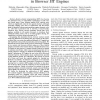Free Online Productivity Tools
i2Speak
i2Symbol
i2OCR
iTex2Img
iWeb2Print
iWeb2Shot
i2Type
iPdf2Split
iPdf2Merge
i2Bopomofo
i2Arabic
i2Style
i2Image
i2PDF
iLatex2Rtf
Sci2ools
NDSS
2015
IEEE
2015
IEEE
The Devil is in the Constants: Bypassing Defenses in Browser JIT Engines
—Return-oriented programming (ROP) has become the dominant form of vulnerability exploitation in both user and kernel space. Many defenses against ROP exploits exist, which can significantly raise the bar against attackers. Although protecting existing code, such as applications and the kernel, might be possible, taking countermeasures against dynamic code, i.e., code that is generated only at run-time, is much harder. Attackers have already started exploiting Just-in-Time (JIT) engines, available in all modern browsers, to introduce their (shell)code (either native code or re-usable gadgets) during JIT compilation, and then taking advantage of it. Recognizing this immediate threat, browser vendors started employing defenses for hardening their JIT engines. In this paper, we show that—no matter the employed defenses—JIT engines are still exploitable using solely dynamically generated gadgets. We demonstrate that dynamic ROP payload construction is possible in two modern web brow...
| Added | 15 Apr 2016 |
| Updated | 15 Apr 2016 |
| Type | Journal |
| Year | 2015 |
| Where | NDSS |
| Authors | Michalis Athanasakis, Elias Athanasopoulos, Michalis Polychronakis, Georgios Portokalidis, Sotiris Ioannidis |
Comments (0)

